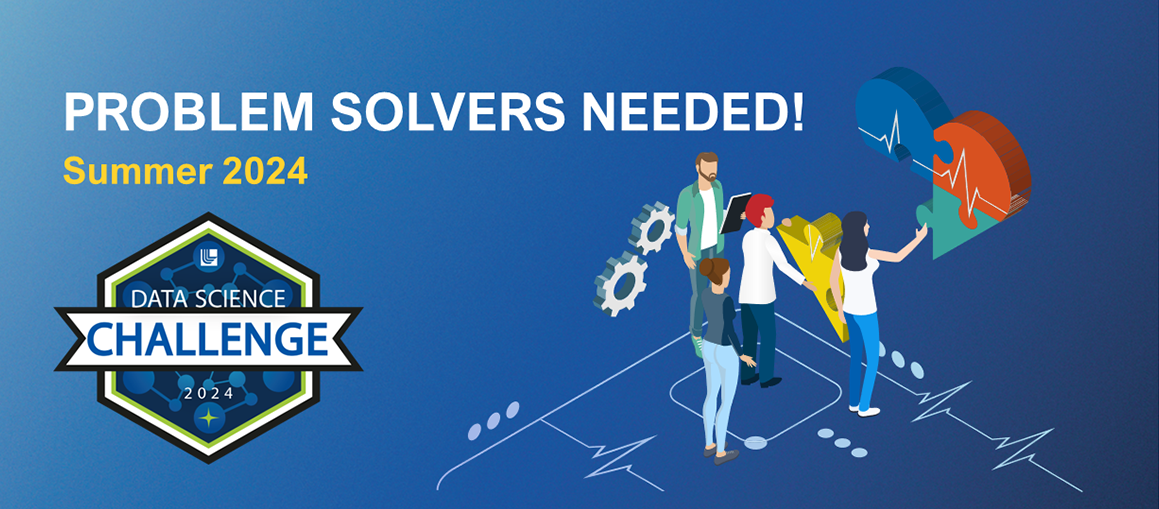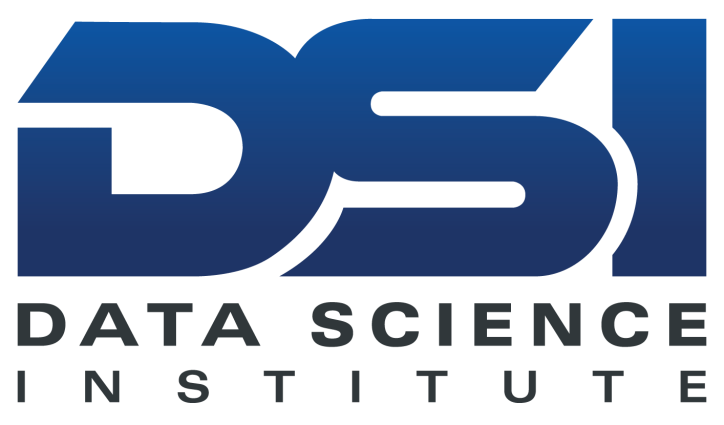Join LLNL for a Data Science Challenge
July 22 – August 2, 2024



View the event calendar >>
Meet your mentors >>
Questions?
Suzanne Sindi, UC Merced | ssindi [at] ucmerced.edu (ssindi[at]ucmerced[dot]edu)
Vagelis Papalexakis, UC Riverside | epapalex [at] cs.ucr.edu (epapalex[at]cs[dot]ucr[dot]edu)
Brian Gallagher, LLNL | gallagher23 [at] llnl.gov (gallagher23[at]llnl[dot]gov)
Omar DeGuchy, LLNL | deguchy1 [at] llnl.gov (deguchy1[at]llnl[dot]gov)
Mary Silva, LLNL | silva223 [at] llnl.gov (silva223[at]llnl[dot]gov)
Sira Neily, LLNL admin | neily1 [at] llnl.gov (neily1[at]llnl[dot]gov)
You could help advance world-class science this summer!
Check out news coverage of the 2023 Data Science Challenge from LLNL, UC Merced, and UC Riverside!
We’re building multidisciplinary teams to tackle real-world data science challenges. And we need the finest scholars to make it happen.
The 2024 application window is closed. Questions? DataScienceChallenge [at] llnl.gov (DataScienceChallenge[at]llnl[dot]gov)
What it takes
- Undergraduates interested in data science or related disciplines
- Graduate students experienced in research or applying skills to a research environment
- Students actively pursuing a degree in mathematics, computer science, engineering, science, or other relevant fields
- Students with computational experience
What to expect
Don’t miss this unique opportunity! The experience will be unlike any other. This intensive 2-week full-time program provides challenging exercises and assignments, tours, and seminars. For 2 weeks, you’ll work on an important data science problem while learning from experts, networking with peers, and developing skills for future internships. You’ll also get a taste of day-to-day life at LLNL, where we have a passion for national service. Read about past Challenges. A stipend will be provided. The Challenge will take place at LLNL.
You’ll solve an exciting problem in cardiology. The electrocardiogram (ECG) provides a noninvasive, cost-effective diagnosis of heart conditions, but the standard 12-lead ECG is inadequate for mapping the heart’s electrical activity in sufficient detail for many clinical applications.
In this challenge, you’ll explore a data-driven approach to reconstructing electro-anatomical maps of the heart at clinically relevant resolutions, combining input from the standard 12-lead ECG with advanced machine learning techniques. Read about your LLNL mentors.
Undergraduate students will:
- Participate in a real-world bioscience data problem
- Work with scientists, engineers, and technical staff to apply skills to the challenge problem in computational science, numerical methods, mathematics, and science
- Gather and analyze data in support of scientific research
- Participate in research and challenge problem evaluation discussions
- Present results to scientists, engineers, and technical staff during final student briefing
- Actively participate in team meetings and large group meetings
Graduate students will:
- Serve as team lead
- Guide the research direction of 4–5 undergraduate students
- Provide advanced technical support to scientists, engineers, and technical staff in materials research and development
- Create and schedule meetings for your team
- Lead presentation of results to scientists, engineers, and technical staff during final student briefing
- Attend team lead meetings
- Students in a Master's program will be considered as a team lead with priority given to Ph.D. students
What to include in your application
- Apply to the Smart Recruiters posting
- Statement of interest (1 page)
- Resume, which should include any relevant coursework
- Optional for undergraduates; required for graduates: 1 letter of recommendation by a faculty member sent on your behalf to the email address above (subject line: "Recommendation Letter <Your Last Name>")
- Please include in your statement of interest the name and email address of the faculty member we should expect the letter from. The application review committee will follow up with faculty on missing/late letters as necessary.
- Graduate students: Include example(s) of your leadership and research experience in your statement of interest. The recommending faculty member should be your graduate advisor.
- Email all letters of recommendation to: DataScienceChallenge [at] llnl.gov (DataScienceChallenge[at]llnl[dot]gov)




